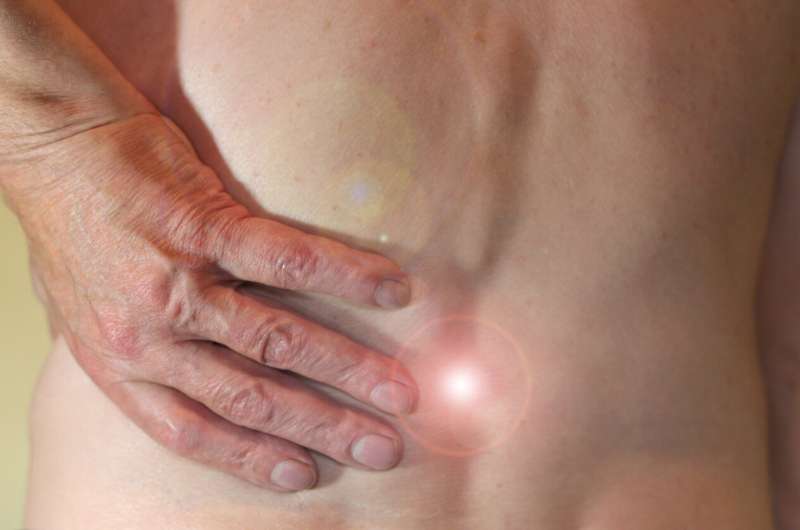This article has been reviewed according to Science X's editorial process and policies. Editors have highlighted the following attributes while ensuring the content's credibility:
fact-checked
peer-reviewed publication
trusted source
proofread
New study provides evidence for more effective brain-based treatment of chronic back pain

A new study in JAMA Network Open may provide key answers to how to help people experiencing chronic back pain.
The study examined the critical connection between the brain and pain for treating chronic pain. Specifically, they looked at the importance of pain attributions, which are people's beliefs about the underlying causes of their pain, to reduce chronic back pain severity.
"Millions of people are experiencing chronic pain and many haven't found ways to help with the pain, making it clear that something is missing in the way we're diagnosing and treating people," said the study's first author Yoni Ashar, Ph.D., assistant professor of internal medicine at the University of Colorado Anschutz Medical Campus.
Ashar and his team tested whether the reattribution of pain to mind or brain processes was associated with pain relief in pain reprocessing therapy (PRT), which teaches people to perceive pain signals sent to the brain as less threatening. Their goal was to better understand how people recovered from chronic back pain. The study revealed after PRT, patients reported reduced back pain intensity.
"Our study shows that discussing pain attributions with patients and helping them understand that pain is often 'in the brain' can help reduce it," Ashar said.
To study the effects of pain attributions, they enrolled over 150 adults experiencing moderately severe chronic back pain in a randomized trial to receive PRT. They found two thirds of people treated with PRT reported being pain-free or nearly so after treatment, compared to only 20% of placebo controls.
"This study is critically important because patients' pain attributions are often inaccurate. We found that very few people believed their brains had anything to do with their pain. This can be unhelpful and hurtful when it comes to planning for recovery since pain attributions guide major treatment decisions, such as whether to get surgery or psychological treatment," said Ashar.
Before PRT treatment, only 10% of participants' attributions of PRT treatment were mind- or brain-related. However, after PRT, this increased to 51%. The study revealed that the more participants shifted to viewing their pain as due to mind or brain processes, the greater the reduction in chronic back pain intensity they reported.
"These results show that shifting perspectives about the brain's role in chronic pain can allow patients to experience better results and outcomes," Ashar adds.
Ashar says that one reason for this may be that when patients understand their pain as due to brain processes, they learn that there is nothing wrong with their body and that the pain is a 'false alarm' being generated by the brain that they don't need to be afraid of.
The researchers hope this study will encourage providers to talk to their patients about the reasons behind their pain and discuss causes outside of biomedical ones.
"Often, discussions with patients focus on biomedical causes of pain. The role of the brain is rarely discussed," said Ashar. "With this research, we want to provide patients as much relief as possible by exploring different treatments, including ones that address the brain drivers of chronic pain."
More information: Reattribution to Mind-Brain Processes and Recovery From Chronic Back Pain A Secondary Analysis of a Randomized Clinical Trial, JAMA Network Open (2023). DOI: 10.1001/jamanetworkopen.2023.33846. jamanetwork.com/journals/jaman … tworkopen.2023.33846




















